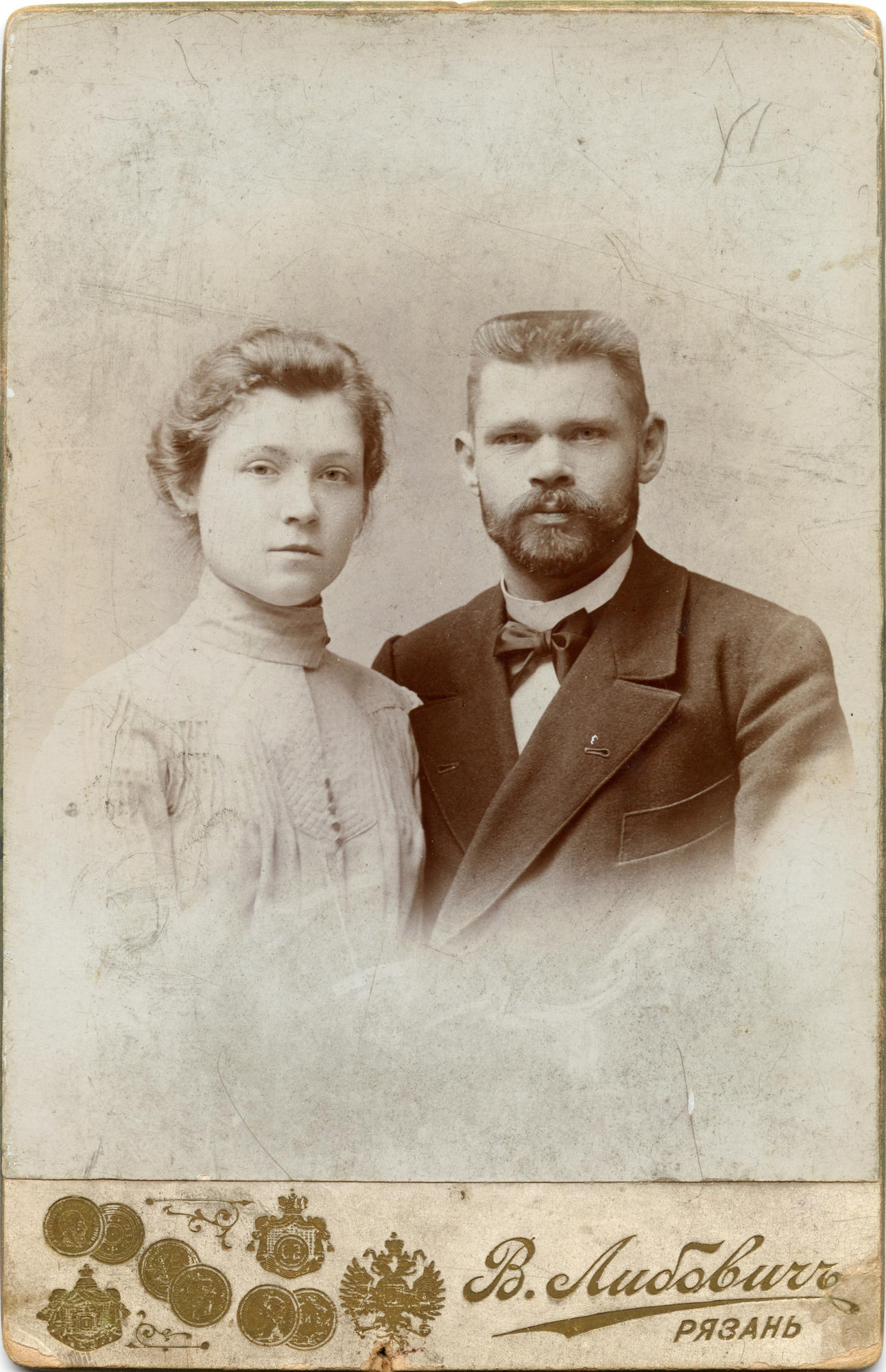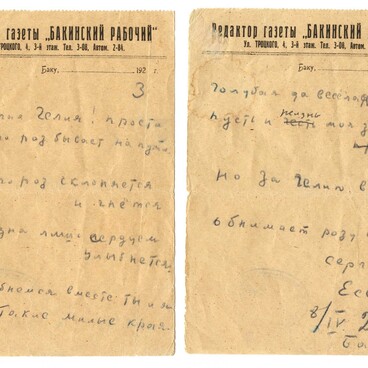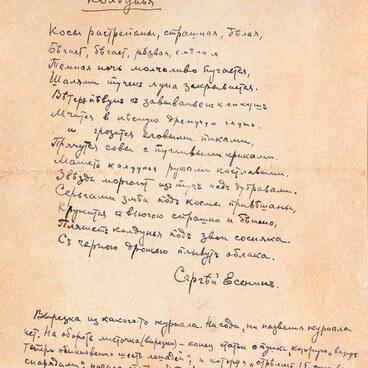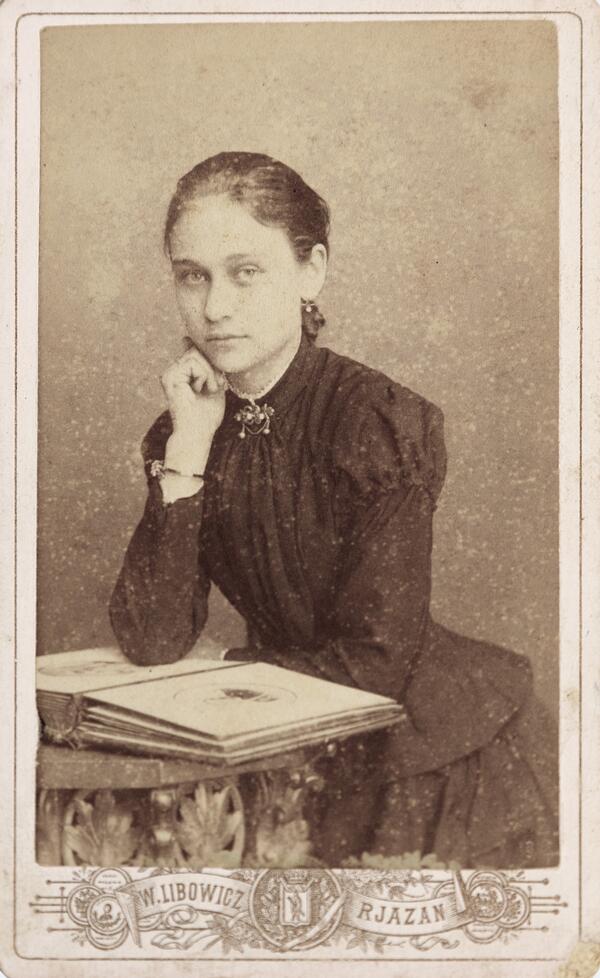Shown in the photograph are Yevgeny Khitrov and his wife Natalia. He was the literature teacher in the Spas-Klepiki school attended by Sergei Esenin and left the memoirs that give an idea of early writing and development of the poet. In particular, Khitrov noted that ‘initially Esenin here too was nondescript among his schoolmates’. However, the teacher highly appreciated the first poetic trials of Esenin. He especially liked the ‘Stars’ poem:
Clear little stars, high bright stars,
What are you keeping to yourself?
What are you hiding?
Stars, carrying with you such deep thoughts,
What is this power you have to fill our souls?
‘I used to notice that in the evening everybody are sitting in the classroom and strenuously doing homework, literally boning their subjects, while Serezha is sitting somewhere in the classroom corner, biting his pencil, and writing the forethought poems line by line, — remembered his classmate Anatoly Aksenov. — In the conversation I ask him: “Well, Serezha, do you really wish to be a writer?” He answers: “I”d love to”. I ask: “How can you prove that will become a writer? “. He answers: “Teacher Khitrov checks my verses, he says that my verses are apparently not bad”’.
Upon graduation from the school Esenin presented Khitrov with 2 notebooks of his poems. Natalia Khitrova was also a teacher and taught reading and writing in the school. She also knew the poet when he attended the Spas-Klepiki school.
In Khitrov’s reminiscences devoted to the first poetic experiences the teacher wrote: “Esenin began to write during his first school year. His classmates told me about that. But he began to bring them to me only during the second school year. There were many versemakers, some of them were rather productive and bombarded me with heaps of their “works”. I often had to take special measures in order to damp their ardour… I somewhat encouraged Esenin, but in the early going I treated his verses with restraint.
His poem were short, first all of them were on the subject of love. I did not really enjoy them. The poems on other subjects seemed meaningless to me. On top of that I set my main lessons in literature and stylistics for the third study year. Just at that point Yesenin pushed himself forward among other versemakers. He drowned himself in the study of literature. His studies were much wider than the routine programme. His reading was vast. He especially liked to listen to my classroom reading’.
Clear little stars, high bright stars,
What are you keeping to yourself?
What are you hiding?
Stars, carrying with you such deep thoughts,
What is this power you have to fill our souls?
‘I used to notice that in the evening everybody are sitting in the classroom and strenuously doing homework, literally boning their subjects, while Serezha is sitting somewhere in the classroom corner, biting his pencil, and writing the forethought poems line by line, — remembered his classmate Anatoly Aksenov. — In the conversation I ask him: “Well, Serezha, do you really wish to be a writer?” He answers: “I”d love to”. I ask: “How can you prove that will become a writer? “. He answers: “Teacher Khitrov checks my verses, he says that my verses are apparently not bad”’.
Upon graduation from the school Esenin presented Khitrov with 2 notebooks of his poems. Natalia Khitrova was also a teacher and taught reading and writing in the school. She also knew the poet when he attended the Spas-Klepiki school.
In Khitrov’s reminiscences devoted to the first poetic experiences the teacher wrote: “Esenin began to write during his first school year. His classmates told me about that. But he began to bring them to me only during the second school year. There were many versemakers, some of them were rather productive and bombarded me with heaps of their “works”. I often had to take special measures in order to damp their ardour… I somewhat encouraged Esenin, but in the early going I treated his verses with restraint.
His poem were short, first all of them were on the subject of love. I did not really enjoy them. The poems on other subjects seemed meaningless to me. On top of that I set my main lessons in literature and stylistics for the third study year. Just at that point Yesenin pushed himself forward among other versemakers. He drowned himself in the study of literature. His studies were much wider than the routine programme. His reading was vast. He especially liked to listen to my classroom reading’.





